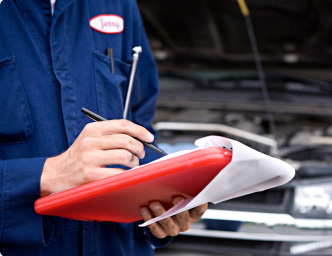Part of the engineering that goes into designing a vehicle includes testing its components to ensure that they meet durability and safety standards. Because of this, manufacturers have a good idea how long the parts in your vehicle will last under normal driving conditions. For this reason, they give us guidelines to follow regarding how often to inspect the various parts and systems on our cars, trucks, and SUVs.
Vehicular components are required to meet certain standards. The government mandates some of these standards, while others are set by the auto industry. Recommended car maintenance schedules are designed to help motorists maintain these standards. Disregarding routine maintenance or procrastinating on preventive maintenance will result in lowered performance and reduced safety for any vehicle.
Maintenance schedules are designed to ensure three areas of vital automotive performance for vehicle owners: protection of the vehicle itself, fuel economy, and safety.
Protection
Your vehicle’s components need protection from dirt, road damage, rust, corrosion, and fuel and combustion byproducts. (Protective components include filters and fluids.)
Most of the fluids in your truck are there to keep the vehicle running smoothly and to protect the vehicle from corrosion, damage, or harmful contaminants. These fluids need to be changed regularly in order to continue protecting your truck.
For example, motor oil lubricates your engine, which keeps it running well, but it also contains detergents and other additives that clean your engine and protect it from corrosion. Your vehicle’s engine was engineered for best performance with a specific weight and type of motor oil. Denver area drivers should always be careful to use the right motor oil for their engine.
Over time, the vital additives in motor oil are depleted, and the oil becomes contaminated by dirt, water, and waste gases from combustion. So, to keep your engine clean and to continue to protect it from corrosion, the oil has to be changed periodically.
Efficiency
Over time, your vehicle’s systems will get dirty and parts will wear down. Cleaning dirty systems and replacing worn parts will improve the efficiency of your vehicle, which is usually measured in terms of fuel economy and power output.
For example, your fuel system components gradually get clogged up with gum and varnish from gasoline. This restricts fuel flow, which lowers your engine’s efficiency. Gas mileage drops as a result.
Cleaning your fuel system will restore MPG and improve gas mileage.
Safety
 Some of your car’s systems must be maintained for safety reasons. Your brakes are a prime example of this. Brake pads and brake fluid need to be replaced in order to ensure good braking power. Poorly maintained brakes lead to accidents for Centennial drivers.
Some of your car’s systems must be maintained for safety reasons. Your brakes are a prime example of this. Brake pads and brake fluid need to be replaced in order to ensure good braking power. Poorly maintained brakes lead to accidents for Centennial drivers.
Your owner’s manual is your first resource when it comes to knowing when and how to maintain your truck. Of course, you can consult with a your Davis Repair service advisor. He or she can give you good auto advice on how to adjust your service schedule to account for climate, local road conditions (potholes!), and your driving distances.
Beyond routine maintenance, your vehicle also requires regular inspections. These inspections are usually recommended at specific mileage intervals, like fifteen or twenty thousand miles. The interval is based on the known life expectancy for particular components in your truck. Regular inspections will identify vehicular components that need to be repaired or replaced before damage is done to the vehicle or safety is compromised. They are also designed to safeguard the efficiency and performance of your vehicle.
The multi-point inspection that comes with a full-service oil change does not cover all of the regular inspections your vehicle needs for peak performance and safety. Check with the automotive professionals at Davis Repair to find out what additional inspections your vehicle needs and how often. Good car care requires regular and consistent maintenance. But good maintenance pays for itself in better gas mileage and fewer costly repairs. It may even save your life.